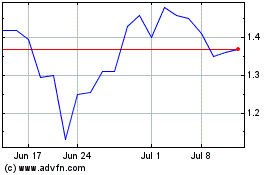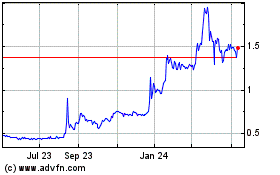By Ben Eisen
Private investors are directly buying a small but growing share
of loans that have long been the domain of Fannie Mae and Freddie
Mac, a sign of the changing dynamics in the $11 trillion mortgage
industry.
More mortgages that meet the standards for Fannie and Freddie to
buy are instead flowing into the private market, where banks and
other financial institutions pool them into bonds and sell them to
investors without government backing. Firms that have recently
issued these so-called private-label securities with a significant
amount of such loans in them -- some up to 100% -- include Chimera
Investment Corp. and Redwood Trust Inc., both real-estate
investment trusts, as well as JPMorgan Chase & Co. and Flagstar
Bancorp Inc.
Fannie and Freddie perform a similar middleman role in moving
mortgages from lenders to investors, though in those instances the
government takes on some of the risk. In the last year or so,
investors have proven increasingly willing to forgo the government
backstop and buy private mortgage bonds, indicating they have grown
more comfortable taking risk for more potential return. The fact
that more investors want to buy these securities means banks and
other firms can package these deals more profitably, which in some
cases lets them offer better bids than the agencies.
"I think there's a number of investors interested in playing and
engaging in this market," said Kristy Fercho, president of the
mortgage business at Flagstar. The company put together two deals
last year made up largely of conforming loans -- or loans that meet
Fannie and Freddie's standards -- for investor properties.
Though the proportion of loans securitized by private buyers
remains just a speck in the broader market, it is growing. Last
year, $3.9 billion of Fannie- and Freddie-eligible loans went into
private-label securities, and the year before $4 billion did, both
roughly tripling 2016 levels, according to broker-dealer Amherst
Pierpont Securities LLC.
Don Layton, chief executive of Freddie Mac, said in a recent
interview that the agency is watching the trend, but that it
doesn't affect most of the loans the agency guarantees. "It's stuff
at the margins for us," Mr. Layton said.
The private market was a formidable rival to Fannie and Freddie
before the financial crisis, but efforts to restart it since then
have largely failed. If the latest activity is the start of a
bigger shift, then Fannie and Freddie's role in housing finance
could shrink through market forces rather than congressional
action.
Shrinking Fannie and Freddie is the goal of some lawmakers and
policy makers, including Republicans who want government to play a
smaller role in housing. Lawmakers have tried unsuccessfully to
remake the agencies since the financial crisis more than a decade
ago. Some industry watchers think Mark Calabria, a sometime critic
of the agencies who has been nominated to run their regulator, the
Federal Housing Finance Agency, could try to encourage the private
market's growth as a backdoor way to diminish the government
entities, which guarantee nearly half of mortgages issued in the
U.S.
"In effect, this effort to reduce the footprint is well under
way," said Mark Zandi, chief economist at Moody's Analytics. "It's
happening and it is consequential."
About 45% of mortgages originated in the January-to-September
period last year went into Fannie and Freddie securities, according
to the Urban Institute, a think tank. At its most recent peak in
2008, that proportion was 65%.
In the first nine months of last year, 1.9% of mortgage
originations went into private-label securities, according to the
Urban Institute. At the trough in 2009, essentially zero did. The
rest are held by the lenders who made them or securitized by Ginnie
Mae, the government-owned mortgage corporation that guarantees
loans to many first-time buyers and veterans.
The recent moves stem from the changing calculus for lenders
deciding where to sell their loans. Fannie and Freddie charge
guarantee fees that erode lenders' haul from selling loans. When
the fees are high enough, it can be more efficient to sell to the
private market, which can be more nimble in its pricing.
When San Diego-based Guild Mortgage Co., for example, wants to
sell Fannie- and Freddie-eligible loans, it collects bids from
about a dozen private-market buyers and then compares those options
with pricing offered by the agencies. Recently, private buyers have
offered better deals on some loans. Like many lenders, Guild has
found private-market pricing particularly attractive for loans
where the agencies charge higher guarantee fees, including those
financing investment properties, as well as loans with high
balances.
It isn't certain to stay this way. The growth in private buyers
has forced them to also compete with one another, analysts say, and
the share of private-label securities made of agency-eligible loans
dropped at the end of last year.
Some lenders say Fannie and Freddie have flagged to them the
recent market dynamics, reminding them that a lender is supposed to
sell a representative sample of its loans to the agencies. They
have interpreted that as a directive to not to sell their
highest-quality loans to the private market while handing
lower-quality ones to the government entities.
"They will fire a friendly shot across the bow" for lenders
around the market, said David Battany, who oversees capital markets
at Guild Mortgage.
In some instances, those in the market have noticed Fannie and
Freddie adjusting their pricing, making them more competitive with
the private market.
Amherst Pierpont estimated that about 10% of Fannie- and
Freddie-eligible loans issued in September 2018 could be more
cheaply pooled into private-label deals.
"Ultimately mortgage originators are in the business of best
execution," said Chris Helwig, a managing director at Amherst
Pierpont.
Write to Ben Eisen at ben.eisen@wsj.com
(END) Dow Jones Newswires
March 09, 2019 07:14 ET (12:14 GMT)
Copyright (c) 2019 Dow Jones & Company, Inc.
Fannie Mae (QB) (USOTC:FNMA)
Historical Stock Chart
From Aug 2024 to Sep 2024

Fannie Mae (QB) (USOTC:FNMA)
Historical Stock Chart
From Sep 2023 to Sep 2024
